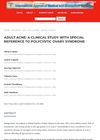 December 1989 in “The Journal of Dermatologic Surgery and Oncology”
December 1989 in “The Journal of Dermatologic Surgery and Oncology” New techniques and findings in dermatologic surgery show improved pain management, safer liposuction, better hair transplantation, and effective treatments for skin conditions.

Oral contraceptives may cause significant hair loss in women.
 June 2024 in “Australasian Journal of Dermatology”
June 2024 in “Australasian Journal of Dermatology” A 13-year-old boy with a rare scalp condition improved significantly with isotretinoin, minoxidil, oral steroids, and antiseptic shampoo.
April 2019 in “Journal of the Endocrine Society” A woman with Cushing's syndrome improved after surgery to remove an adrenal tumor.
53 citations,
July 2018 in “Drug design, development and therapy” Janus kinase inhibitors show promise in treating alopecia areata but need better topical formulations.
 7 citations,
September 2023 in “Cancer Treatment Reviews”
7 citations,
September 2023 in “Cancer Treatment Reviews” Managing side effects of endocrine therapy is crucial to improve adherence and survival in breast cancer patients.
 2 citations,
April 2023 in “Pharmaceuticals”
2 citations,
April 2023 in “Pharmaceuticals” Testosterone therapy for postmenopausal women appears safe and may protect against heart disease, but requires constant monitoring and more research for long-term effects.

Plant-based compounds can improve wound dressings and skin medication delivery.
 October 2021 in “Cosmoderma”
October 2021 in “Cosmoderma” Hair loss can be managed with treatments like minoxidil, finasteride, and others, but there are still gaps in effectiveness and off-label usage is increasing.
 February 2020 in “International Journal of Medical and Biomedical Studies”
February 2020 in “International Journal of Medical and Biomedical Studies” Adult acne is often mild and common on the cheek, with a low prevalence of PCOS in female patients, but more severe acne and skin damage in those with PCOS.
 19 citations,
April 2019 in “Journal of the European Academy of Dermatology and Venereology”
19 citations,
April 2019 in “Journal of the European Academy of Dermatology and Venereology” Acne lesions start with changes in hair follicles and increase in inflammation, suggesting a cycle that could affect treatment strategies.
 1 citations,
November 2013 in “Pediatrics in Review”
1 citations,
November 2013 in “Pediatrics in Review” Effective acne treatment and patient education are crucial to prevent long-term physical and psychological effects.
 April 2024 in “International journal of women's health”
April 2024 in “International journal of women's health” Adult female acne is a complex condition that can worsen with menopause, requiring holistic treatment and tailored skincare at different life stages.
 13 citations,
September 2011 in “American Journal of Clinical Dermatology”
13 citations,
September 2011 in “American Journal of Clinical Dermatology” The oral contraceptive ethinylestradiol/chlormadinone acetate is effective in reducing acne and improving other skin conditions related to high androgen levels.
 2 citations,
September 2007 in “International Journal of Impotence Research”
2 citations,
September 2007 in “International Journal of Impotence Research” Local testosterone treatment improved sexual desire in a female with fragile X syndrome.
 38 citations,
November 2012 in “Expert Opinion on Drug Safety”
38 citations,
November 2012 in “Expert Opinion on Drug Safety” Common acne treatments can cause various side effects, like skin irritation and more serious issues, but combination therapies are often more effective and better tolerated.
 6 citations,
November 1993 in “Contact dermatitis”
6 citations,
November 1993 in “Contact dermatitis” Spironolactone in anti-acne cream can cause allergic skin reactions in some people.
 5 citations,
February 2013 in “Expert Review of Dermatology”
5 citations,
February 2013 in “Expert Review of Dermatology” New acne treatments include combination creams, advanced retinoids, and light therapies, focusing on safety and patient adherence.
 22 citations,
March 2018 in “American Journal of Clinical Dermatology”
22 citations,
March 2018 in “American Journal of Clinical Dermatology” New acne treatments show promise as alternatives to traditional therapies.
 1 citations,
May 2015 in “Primary Health Care”
1 citations,
May 2015 in “Primary Health Care” Effective acne treatment varies by type, with topical and oral medications showing strong evidence, and patient education and support are crucial.
 1 citations,
November 1996 in “Journal of Cutaneous Medicine and Surgery”
1 citations,
November 1996 in “Journal of Cutaneous Medicine and Surgery” Hormones, especially androgens, play a key role in causing acne, and treatments like hormone control pills and hormone-blocking medications can help.
 46 citations,
September 2016 in “Clinical, Cosmetic and Investigational Dermatology”
46 citations,
September 2016 in “Clinical, Cosmetic and Investigational Dermatology” Hormonal treatments are effective for severe or persistent acne and should be used with other acne therapies, considering potential side effects.
 42 citations,
September 2018 in “Journal der Deutschen Dermatologischen Gesellschaft”
42 citations,
September 2018 in “Journal der Deutschen Dermatologischen Gesellschaft” Adult female acne requires a comprehensive treatment approach, including medical options and lifestyle changes, with attention to psychological well-being.
 1 citations,
January 2010 in “Serbian Journal of Dermatology and Venereology”
1 citations,
January 2010 in “Serbian Journal of Dermatology and Venereology” The document concludes that effective acne treatment requires a personalized combination of therapies and long-term commitment, with retinoids being important for maintenance.
 1 citations,
January 1989 in “Journal of dermatological treatment”
1 citations,
January 1989 in “Journal of dermatological treatment” Azelaic acid may help treat acne by killing bacteria, reducing inflammation, and preventing clogged pores.
 38 citations,
October 1996 in “Dermatologic Clinics”
38 citations,
October 1996 in “Dermatologic Clinics” Certain hormone treatments can improve acne and related conditions in women.
 10 citations,
January 2017 in “Expert Opinion on Pharmacotherapy”
10 citations,
January 2017 in “Expert Opinion on Pharmacotherapy” The conclusion is that more research is needed to better understand and treat adult acne, and that patient education and simple treatment plans are important for better results.
 8 citations,
June 2017 in “Hormone Molecular Biology and Clinical Investigation”
8 citations,
June 2017 in “Hormone Molecular Biology and Clinical Investigation” Mild thyroid issues don't affect the metabolism and hormones of women with PCOS.
 4 citations,
December 2021 in “Experimental and Therapeutic Medicine”
4 citations,
December 2021 in “Experimental and Therapeutic Medicine” Adult female acne is complex and requires a combination of treatments for effective management.
 233 citations,
November 2002 in “The journal of investigative dermatology/Journal of investigative dermatology”
233 citations,
November 2002 in “The journal of investigative dermatology/Journal of investigative dermatology” Creating stronger blockers for skin enzymes might lead to better treatment for conditions like acne and excessive hair growth.




























